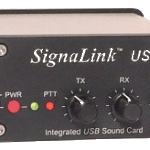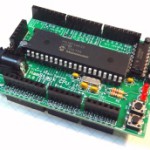Posts Tagged ‘security’
 Back Up Your Computers: A Critical Part of National Preparedness Month
Back Up Your Computers: A Critical Part of National Preparedness Month
As amateur radio operators, we’re always prepared for the unexpected—whether it’s a natural disaster, a power outage, family pets getting eaten, or an emergency communication scenario. This September, as we observe National Preparedness Month, it’s the perfect time to ensure that all aspects of our emergency readiness are covered. One often overlooked but vital aspect of preparedness is securing the data on our computers through regular backups.
Whether you’re logging contacts, managing digital modes, or maintaining software-defined radios, your computer is a critical part of your station. Losing data due to hardware failure, ransomware, or a natural disaster can set you back significantly. Here’s how you can make sure your valuable data is safe and sound.
Why Regular Backups Are Essential
- Protect Your Logs and Records: As radio enthusiasts, we accumulate a lot of data—contact logs, QSL card scans, configuration files for digital modes, software settings, and more. Losing these records can mean losing years of hard work.
- Preserve Software and Settings: Many of us use specialized software to run our radios and interfaces. Setting everything up again from scratch after a computer crash can be a time-consuming and frustrating experience.
- Guard Against Ransomware and Malware: Cyber threats are on the rise, and radio operators are not immune. Backing up your data can ensure you have a clean version to restore, even if you become a victim of ransomware or another attack.
- Plan for Natural Disasters: If your area is prone to flooding, hurricanes, or other disasters, having off-site or cloud backups can help ensure your data survives even if your equipment does not.
Types of Backups: Which One Is Right for You?
There are several types of backups you can consider, each with its own benefits:
- Local Backups: These involve copying data to an external hard drive or a network-attached storage (NAS) device. They are quick, reliable, and allow for rapid recovery, but they can be vulnerable to theft, damage, or the same disasters affecting your computer.
- Cloud Backups: Services like Google Drive, Dropbox, or dedicated backup services like Backblaze or Carbonite provide remote storage for your data. These backups are accessible from anywhere and are protected against local disasters, but they depend on a reliable internet connection and can come with ongoing subscription costs.
- Hybrid Approach: Combining local and cloud backups offers the best of both worlds. Local backups allow for quick recovery, while cloud backups provide an off-site option that ensures data safety even if your entire station is compromised.
How to Create a Backup Plan
- Identify Critical Data: Make a list of files and directories that are essential to your operations. This might include your logging software database, configuration files, QSL card images, and any custom scripts you’ve created.
- Choose a Backup Method: Decide whether a local, cloud, or hybrid approach works best for you. Consider your internet speed, the amount of data you need to back up, and your budget.
- Set a Schedule: Regularity is key to effective backups. Daily or weekly backups are ideal for most operators. Make sure you automate the process as much as possible to avoid human error or forgetfulness.
- Test Your Backups: A backup is only useful if it works! Periodically test your backups by restoring a file or directory to ensure everything is functioning as expected.
- Keep an Off-Site Copy: If you’re relying on local backups, consider keeping a copy off-site, perhaps at a friend’s house or in a safety deposit box, for added protection against physical damage or theft.
Practical Steps for Backing Up Your Data
- Use Backup Software: Windows and macOS both come with built-in backup tools (like Windows Backup and Time Machine). For Linux, tools like
rsynccan automate backups. - Automate the Process: Set your backup software to run automatically at regular intervals. This ensures you always have a recent backup without needing to remember to do it manually.
- Use Strong Encryption: If you’re storing sensitive data or using cloud storage, make sure your backups are encrypted to prevent unauthorized access.
- Check Your Backup Integrity: Regularly review your backup logs and run integrity checks to ensure your data is being backed up correctly.
- Keep Multiple Versions: If possible, keep multiple versions of your backups to protect against data corruption or accidental deletion. This can be particularly important if you need to restore a specific version of a file or recover from a mistake.
Conclusion
This National Preparedness Month, take the time to review your data backup strategy. Protecting your data is just as important as maintaining your radio equipment—especially in emergencies. By having a solid backup plan in place, you can ensure that no matter what happens, you’ll be back on the airwaves with minimal disruption.
Remember, being prepared means being ready for anything—don’t let a data loss incident catch you off guard!
This article was originally posted at Radio Artisan.
 LHS Episode #161: Someone Spelt the Soup
LHS Episode #161: Someone Spelt the Soup
 This is a very exciting episode of Linux in the Ham Shack for us. It's so special, that it's a double episode! That's right, it's like getting two episodes in one. Your hosts (one of them new to the program) discuss winter field day, WxBot, the origin of Debian Linux, SSTV using Linux, OpenSSH security concerns, solving the Rubik's Cube with Linux and a whole lot more. Hope you enjoy, and please welcome our new host!
This is a very exciting episode of Linux in the Ham Shack for us. It's so special, that it's a double episode! That's right, it's like getting two episodes in one. Your hosts (one of them new to the program) discuss winter field day, WxBot, the origin of Debian Linux, SSTV using Linux, OpenSSH security concerns, solving the Rubik's Cube with Linux and a whole lot more. Hope you enjoy, and please welcome our new host!
73 de The LHS Crew
 LHS Episode #159: Digital Mode Interfaces
LHS Episode #159: Digital Mode Interfaces
 Hello, dear listeners! Thank you for tuning into another episode of Linux in the Ham Shack. In this week's episode, your hosts discuss a variety of topics from 600-meter operation to Linux in cars to Star Wars. Our featured segment tonight is a look at PC-to-radio interfaces for digital mode communication. Thanks for tuning into, and hope to see you next time.
Hello, dear listeners! Thank you for tuning into another episode of Linux in the Ham Shack. In this week's episode, your hosts discuss a variety of topics from 600-meter operation to Linux in cars to Star Wars. Our featured segment tonight is a look at PC-to-radio interfaces for digital mode communication. Thanks for tuning into, and hope to see you next time.
73 de The LHS Team
 LHS Episode #137: Bacon Wins
LHS Episode #137: Bacon Wins
 Greetings, salutations and happy holidays! Today your weary hosts (minus one) bring you some great information about great topics, like: Why you should avoid qrznow.com, why you should upgrade your WordPress installation, why you should try ElementaryOS, why the government is like a turtle, and why bacon renders your argument invalid. Be well, listen often, and stay safe.
Greetings, salutations and happy holidays! Today your weary hosts (minus one) bring you some great information about great topics, like: Why you should avoid qrznow.com, why you should upgrade your WordPress installation, why you should try ElementaryOS, why the government is like a turtle, and why bacon renders your argument invalid. Be well, listen often, and stay safe.
73 de The LHS Guys
 LHS Episode #135: A Mouthful of Potatoes
LHS Episode #135: A Mouthful of Potatoes
 In this fortnight’s episode of Linux in the Ham Shack, Pete (VE2XPL), returns to the land of the living. Your intrepid hosts discuss explosions in the sky, a “holiday” for ham radio operators, Linux vulnerabilities, caipirinhas, and ask the vital question: What is Allstar Link and does anyone use it? All that and more in this action-packed installment of LHS. Thanks for watching, and as always…
In this fortnight’s episode of Linux in the Ham Shack, Pete (VE2XPL), returns to the land of the living. Your intrepid hosts discuss explosions in the sky, a “holiday” for ham radio operators, Linux vulnerabilities, caipirinhas, and ask the vital question: What is Allstar Link and does anyone use it? All that and more in this action-packed installment of LHS. Thanks for watching, and as always…
73 de The LHS Guys
 LHS Episode #105: Linux on the HamStack
LHS Episode #105: Linux on the HamStack
 That’s right, we’ve got yet another interview in this show. Is anyone screaming “UNCLE!” yet? George from Sierra Radio Systems and Nick from Pignology are our guests tonight, talking about several of their ham radio related products. They have a product launch they’re doing at the Dayton Hamvention this year and wanted to let everyone know what they have in store so it’s out there before the chaos in Ohio. Don’t despair, howver. This is not a sales pitch. Instead, our fine feathered guests get down into the nitty gritty of their product, explaining what it does, how it does it, what hardware it uses and what software as well. You’ll be happy to know it’s all Free Software based and an incredible find for anyone looking for comprehensive remote station control. George and Nick also happen to be responsible for a significant chunk of the donation money LHS needed to be a part of Dayton this year so we are eternally grateful to them for that. The best part of all this: That’s only HALF of the show. This one’s so packed full of information it might just explode.
That’s right, we’ve got yet another interview in this show. Is anyone screaming “UNCLE!” yet? George from Sierra Radio Systems and Nick from Pignology are our guests tonight, talking about several of their ham radio related products. They have a product launch they’re doing at the Dayton Hamvention this year and wanted to let everyone know what they have in store so it’s out there before the chaos in Ohio. Don’t despair, howver. This is not a sales pitch. Instead, our fine feathered guests get down into the nitty gritty of their product, explaining what it does, how it does it, what hardware it uses and what software as well. You’ll be happy to know it’s all Free Software based and an incredible find for anyone looking for comprehensive remote station control. George and Nick also happen to be responsible for a significant chunk of the donation money LHS needed to be a part of Dayton this year so we are eternally grateful to them for that. The best part of all this: That’s only HALF of the show. This one’s so packed full of information it might just explode.
73 de The LHS Guys












